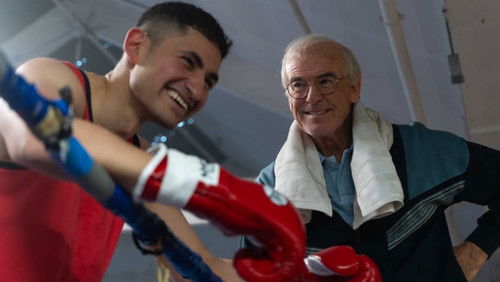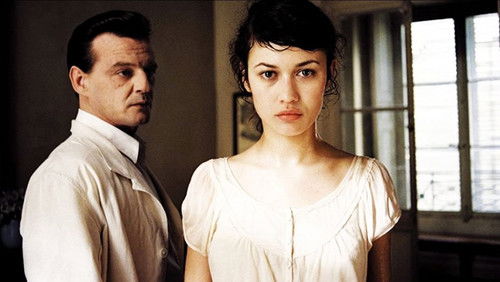Zwei Tage, eine Nacht (2014)
48KZwei Tage, eine Nacht: Directed by Jean-Pierre Dardenne, Luc Dardenne. With Marion Cotillard, Fabrizio Rongione, Catherine Salée, Baptiste Sornin. Liège, Belgium. Sandra is a factory worker who discovers that her workmates have opted for a EUR1,000 bonus in exchange for her dismissal. She has only a weekend to convince her colleagues to give up their bonuses in order to keep her job.
“Iu0026#39;ve never been a fan of Darwinian theory: why interfere when mother nature will straighten out the weak? Not especially after watching this simple, yet powerful film.u003cbr/u003eu003cbr/u003eThe Dardennes do not make make morality tales. Even though their characters navigate practical dilemmas that challenge their moral stance. This moral stance in turn, corresponds with realities in which these characters exist — it is a ramification of larger economic forces that govern the poor and working-class. u003cbr/u003eu003cbr/u003eIt is with that in mind, that the Dardenneu0026#39;s narrative strategy reflects neorealist tradition and normative ethics. The main point has always been for us, the audience, to observe the conditions in these charactersu0026#39; daily lives, how they conduct themselves or negotiate problems and resolve dilemmas. In a Dardenne film, weu0026#39;re allowed to engage unobtrusively, without passing judgements on what they choose and how they arrive at those choices eventually.u003cbr/u003eu003cbr/u003eTwo Days, One Night is set against the backdrop of an industrial town in Liège, Belgium. Sandra Bya (Marion Cotillard) is a working-class wife and mother who earns her living in a solar panel factory. After a nervous breakdown, she is forced to take a break from work. The duration of her absence isnu0026#39;t known to viewers, but sufficient for supervisor Mr. Dumont to notice it was possible to cover Sandrau0026#39;s work if all 16 workers pulled an extra 3-hours per shift.u003cbr/u003eu003cbr/u003eSoon, the factoryu0026#39;s management proposes 1,000 bonus to each staff if they agree to make Sandra redundant. By the time Sandra returns to work and knows what happened, majority of her co-workers had opted for the bonus. Factory foreman Jean-Marc influenced their votes by saying if Sandra wasnu0026#39;t laid off, maybe they (her co- workers) would be. Regardless, her fate has been sealed via democratic means.u003cbr/u003eu003cbr/u003eConcerned friend and colleague Juliette appeals to Mr. Dumont and negotiates a secret snap ballot. Everyone will vote first thing Monday morning — will they choose the 1,000 bonus or Sandra? Because the factoryu0026#39;s management surely could not afford both.u003cbr/u003eu003cbr/u003eTwo Days, One Night refers to the weekend: rest days where hard workers retreat in comfort to the sanctuary of their homes and private lives. When Sandra is forced to intrude peopleu0026#39;s lives on a precious weekend, visit each and every one of her 16 co-workers in a bid to change their minds before Monday (I use the word u0026quot;forcedu0026quot; because clearly, Sandra was embarrassed and reluctant to do it), at one point she laments in self-disgust saying u0026quot;I canu0026#39;t stand it. Every time I feel like a beggar, a thief coming to take their money. They look at me ready to hit me. I feel like hitting them too.u0026quot; But kitchen worker and husband Manu urges with maturity and understanding, u0026quot;You have to fight for your job.u0026quot; Both knew Sandra cannot quite walk away and abandon work at the small factory. The family of four has just recently moved out of public housing. Sandra needs the minimum wage job to keep their heads above the water, to keep from going back to welfare assistance.u003cbr/u003eu003cbr/u003eMuch of the film has Manu drive Sandra around the small town of Liège, as the 48-hours clock goes ticking down with growing intensity. The first dilemma is presented as she goes knocking door- to-door, trying to convince fellow employees to give up a salary bonus that they too, badly need. Times are hard and money is tight, her interactions with each co-worker and their subsequent response to her plea is compelling to watch. Lesser film-makers will settle with a cookie cutter protagonist in need of sympathy, but this isnu0026#39;t the case with Luc and Jean-Pierre Dardenne.u003cbr/u003eu003cbr/u003eThere is a real sense here that the space and reality of this film has the relevance of modern social-political commentary. u0026quot;Will you vote for me?u0026quot; — the same question when asked repeatedly, becomes illuminated by varying personal realities. Thus allowing the audience to consider the same situation with changing arguments and evolving perspectives. Every step of the way, the audience absorbs a broad spectrum of humanity as reactions toward Sandra ricochet between doubt and certainty: selfish and cruel, unapologetic and indifferent, defensive and guilt-ridden, conflicted and hesitant, kind and compassionate. At one point, it had me wondering if Sandra, for the sake of some colleagues so dangerously close to the margins of poverty, probably shouldnu0026#39;t be appealing at all — after all, their knapsacks are so much tinier and more fragile than the sling bag draped across her hunched, bony shoulders.u003cbr/u003eu003cbr/u003eAll the above reflects just one, out of several more thought experiments found in the plot design. One particular sub-plot examines Sandrau0026#39;s level of resilience as a recovering depressive, and culminates in an episode involving a box of Xanax. Here, Marion Cotillard turns in her role with master class technique — she applies subdued, matter-of-fact emotional tone with the kind of authenticity and resignation made possible only by an exhausted, dehumanized, defeated soul. Less is accurately more. u003cbr/u003eu003cbr/u003eWhen I saw Lu0026#39;Infant at the Alliance Française de Singapour back in 2005; I was a young adult in her early twenties with the intellectual capital and moral patience of a fish. Coming out of my first experience with the Dardennes, my opinion towards main character Bruno, was straight forward and quite simply, disapproving — what kind of person sells his own newborn child for a meagre sum of money? I left the small theatre with obvious answers and a snap conclusion, partially dissatisfied and disappointed with the filmu0026#39;s ridiculous premise.u003cbr/u003eu003cbr/u003eNearly a decade has passed and now having watched Two Days, One Night; I find myself weighing all variables in the complex social totality embodied by one simple observation: u0026quot;Some people are so rich they donu0026#39;t know what it means to live with so little.u0026quot; I no longer believe in moral absolutes with the reckless naiveté of a youth. What an honest, complex and thought provoking film. How wide-ranging and realistic.u003cbr/u003eu003cbr/u003ecinemainterruptus.wordpress.com”









